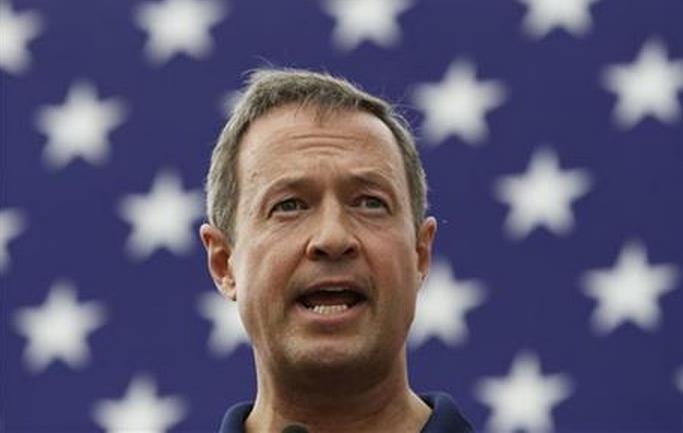In late July, Kevin Kinney, the Democratic candidate for the open state Senate seat in Iowa’s 39th District, got a phone call from a colleague.
Maryland’s Gov. Martin O’Malley, his colleague told him, wanted to help his campaign raise money.
O’Malley, who has said he’s seriously considering a run for the Democratic nomination for president in 2016, has been traversing Iowa and other key states in recent months, shaking hands with local Democrats who can help raise his profile. His political action committee has contributed close to $108,000 to Democratic candidates around the country and paid for more than two-dozen staffers to work in Iowa, New Hampshire and several other states ahead of the midterm elections this fall.
“I’d heard of him,” said Kinney. “But I certainly didn’t know him. I’d never spoke with him. But I’ll take anyone’s help if they’re offering it.”
Less than a week later, O’Malley gave the keynote address in front of a crowd of 30 people at Rocky O’Brien’s, a sports bar in Kinney’s hometown of North Liberty. North Liberty is located in Johnson County, also home to the University of Iowa, and one of the more liberal areas in the state.
In his speech, O’Malley vouched for Kinney as a candidate and talked about the need to elect Democrats statewide in Iowa, the state whose caucuses will kick off the nation’s voting for the Democratic and Republican presidential nominees.
In August O’Malley, through his political action committee O’Say Can You See, began paying eleven staffers to work campaigns through the Iowa state Democratic Party, said O’Malley spokesman Lis Smith, who declined to say what candidates they’re working for.
“It’s a common thing to lend your support in various ways, to build bridges, shared goals and interests,” said Cary Covington, associate professor of American politics at the University of Iowa. “You have to get out there and shake hands and let people get comfortable with you.”
Sue Dvorsky, former chair of the Iowa Democratic Party, said that whether O’Malley is simply laying out his larger plans or has a sincere desire to help the state’s Democrats, his help has been well received.
“Right now he’s here to say ‘How can I help?’. That’s what he’s about,” said Dvorsky. “Right now we’re only thinking about what’s in front of us, which is a dead-heat senate race. If he’s got some bigger motive, well, for now, our interests are complementary.”
In New Hampshire, O’Malley is providing staff for U.S. Senate candidate Jeanne Shaheen and other local candidates, and is scheduled to make his fourth appearance in the state on Friday, when he’ll speak at the annual Portsmouth Democratic banquet.
In his previous visits to the state, which holds the first primary for the nation’s presidential nominating process, he’s made a positive impression, and earned quite a reputation as an orator, said Larry Drake, chair of the Portsmouth City Democratic Committee.
Drake, who saw O’Malley speak in November at the New Hampshire Democratic Party’s Jefferson-Jackson dinner, said he remembers the governor’s impassioned recital of the Star-Spangled Banner, and the bravado with which he bragged on Baltimore’s role in creating the song.
“I can tell you people really remember those things,” he said. “Because we’re New Hampshire, the people who are scheduling these events generally consider who is running for president. But people seem to genuinely like O’Malley.”
Whether that translates into support is too early to say, Drake said.
O’Malley spent Saturday in South Carolina campaigning with Democratic gubernatorial candidate Vincent Shaheen.
Over the next month, he is scheduled to hold a high-profile fundraiser in Los Angeles, speak to the Minneapolis Democratic Party at its annual Founders Day Dinner, and give the keynote address at the Western Gala for the North Carolina Democratic Party.
If he plans to face up against Hillary Clinton, who most expect will run in 2016, he has a lot more handshaking to do. According to the latest RealClearPolitics average of polls taken of Democratic voters in Iowa, Clinton holds a commanding lead with 59 percent of the vote. O’Malley barely registers, claiming 1.7 percent.
But Tim Hagle, political science professor at the University of Iowa, said Clinton roots, at least in Iowa, are not as deep as people assume, and she may be just as vulnerable to being upset as she was in 2008.
Hagle said that when Bill Clinton was running for president in the early 1990s, he all but conceded Iowa to its native son, Sen. Tom Harkin, who was also running. In 2008, he said, Clinton may have assumed her victory and not bothered to build lasting relationships with the type of party officials that could help her today.
“Clinton’s base here is not what you’d think it is,” he said. “That’s why a young upstart like Barack Obama could come in and surprise her” in 2008.
By Mike Persley



Write a Letter to the Editor on this Article
We encourage readers to offer their point of view on this article by submitting the following form. Editing is sometimes necessary and is done at the discretion of the editorial staff.